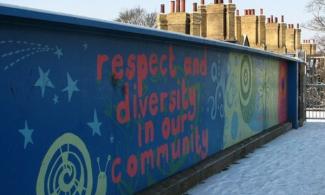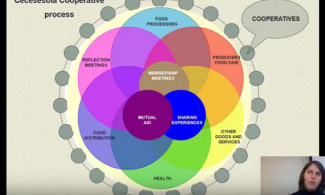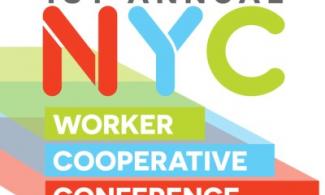I wasn't quite sure what to expect when I wandered into the meeting room. The description discussed the important role of compassion in dealing with conflicts as opposed to the more common acts of assigning blame.
It was led by Michael Johnson who is part of the Valley Alliance of Worker Cooperatives, GEO and has been living in an intentional community for 30 years. Part of this workshop was based on his real-life experiences in attempting to find more productive methods of resolving conflict.
At the core of this workshop lies the idea that if we really want to create a different workplace, then we need to really change the manner of our interactions. Of course, this is also the line of thought that Don Arizmenidiaretta, the spiritual founder of Mondragon, followed for his entire life. The Basque Don saw worker cooperatives as a means of social and human transformation. He saw our cooperative movement as the method by which people would not only have a job that treated them well, but would learn the value of humanity and become better humans through the process.
In the somewhat cynical world of secular economics, we don't always consider that aspect of our movement. This is a shame, because without that guiding ideal, we tend to mirror the dominant world's attitude of human resources, and problem solving. We see people who don't play well with others as threats to the organization and respond appropriately. We can even see people who hold a different opinion as threats. We need a different method.
Michael, of course, recognizes that some people aren't ready for cooperation and communalism. The organization has to remain healthy. The difference, he suggested, is developing a means of active listening and a culture of compassion. Try to understand the other person's point-of-view. We may find more commonality than difference. Even if the person still needs to leave the organization, both parties may obtain positive lessons and grow from the experience.
It was an very interesting discussion to have on only a few hours of sleep! There are many quotes from Arizmendiaretta on the human nature of our cooperatives, but I think that this gets at the core of this workshop: "The human person that proceeds to cultivate his or her abilities with the only objective of being productive, insensibly and fatally becomes a slave to the productive machine."
I take from that comment and the workshop hat we have a duty to ourselves to go beyond "policies" and reach out to the humans in our coops. It doesn't mean that we should tolerate selfish and anti-cooperative behavior, but we should take the time and effort to see our humanity reflected in our co-workers even if the experience involves asking them to change their behavior or leave the cooperative.




Add new comment